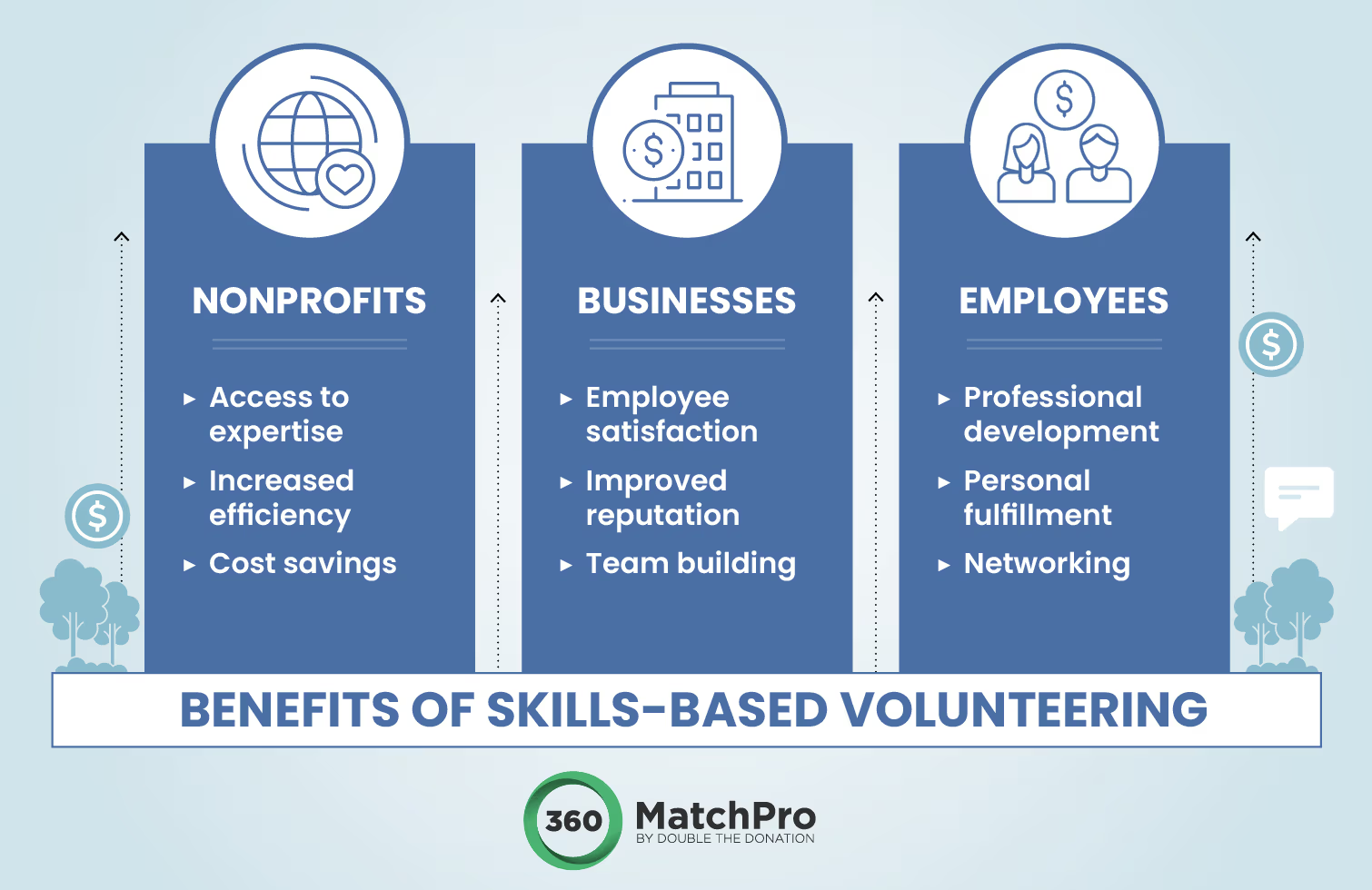Skills-Based Volunteering: What It Is And Why It Matters
Charitable donations, community service, and matching gifts have long been a part of the corporate philanthropy landscape. However, businesses are now tapping into their most valuable asset—their talented workforce—to drive meaningful change in communities.
Skills-based volunteerism is the most rapidly growing form of philanthropy with more than 50% of companies channeling the expertise of their employees to nonprofits. In this guide, we’ll cover everything your business needs to know about skills-based volunteering, including:
- Benefits of Skills-Based Volunteering
- Examples of Skills-Based Volunteering
- 4 Tips for Launching a Skills-Based Volunteer Program
Whether you’re a business leader, a human resources professional, or a passionate advocate for social change within your organization, these insights will empower you to embrace skills-based volunteering and unlock its transformative potential.
What is Skills-Based Volunteering?
Skills-based volunteering is a form of corporate volunteerism in which employees lend their expertise and professional knowledge to support nonprofits or community initiatives. Unlike traditional volunteering, where individuals might perform general tasks like sorting donations or serving food, skills-based volunteering leverages your workforce’s unique talents.
Benefits of Skills-Based Volunteering
Skills-based volunteering is beneficial to the businesses that launch volunteer programs, the employees that participate, and the nonprofits that receive the support. Explore the full list of benefits below:

For Nonprofits
Nonprofits rely on skills-based volunteers for:
- Access to specialized expertise. Skills-based volunteers provide access to specialized expertise, allowing nonprofits to tackle critical projects and challenges that otherwise have gone unaddressed.
- Increased efficiency and impact. With the help of skilled volunteers, nonprofits can complete tasks and projects more efficiently and with a higher level of expertise. According to recent studies, this can increase a nonprofit’s capacity by 35%.
- Cost savings. Skills-based volunteering can result in significant cost savings for nonprofits. By tapping into the expertise of volunteers, organizations can avoid hiring expensive consultants or contractors, which is particularly beneficial for nonprofits with limited financial resources.
To reap these benefits, nonprofits should actively seek partnerships with businesses and explain how corporate support will contribute to the organization’s long-term success.
For Businesses
In exchange for creating transformative change in areas such as education, environment, and healthcare, businesses might receive:
- Improved employee satisfaction: Encouraging employees to participate in skills-based volunteering can boost their engagement and job satisfaction. This, in turn, can reduce turnover.
- Positive corporate reputation: Businesses that support skills-based volunteering demonstrate a commitment to social responsibility, which can help attract customers, clients, and partners who value socially conscious organizations.
- Team building and morale: Volunteering as a team can improve morale and strengthen relationships among employees, leading to a more positive company culture.
While creating a volunteer program requires an ongoing commitment of time and resources, the benefits far outweigh the costs.
For Employees
By getting involved in your skills-based volunteer program, employees can experience:
- Professional development: Skills-based volunteering allows employees to apply their skills in new and meaningful ways. This can lead to professional development, making them more versatile and valuable in their careers.
- Personal fulfillment: Many employees find great personal satisfaction in using their skills to contribute to causes they are passionate about. This sense of purpose and fulfillment can boost overall job satisfaction and well-being.
- Networking: Engaging in skills-based volunteering can expand an employee’s professional network. They may have the opportunity to connect with like-minded professionals, potential mentors, or even future employers, which can be valuable for their career growth.
Employees are the backbone of your volunteer program. Empower them to advocate for the causes they care about and provide feedback on your corporate philanthropy initiatives.
Examples of Skills-Based Volunteering
The specific projects that you pursue will depend on the needs of the nonprofits and the skills and expertise of your employees. However, here are some common examples of skills-based volunteering to guide your efforts:
- Technology: Technology companies often build websites or apps for nonprofits, teach coding skills to underserved communities, or provide IT support to organizations in need.
- Marketing and communications: Businesses with marketing expertise can develop branding materials, manage social media campaigns, or design websites to help nonprofits attract donors.
- Financial literacy: Financial institutions can host workshops on budgeting, saving, and investing, empowering nonprofits to make informed financial decisions.
- Legal services: Law firms and legal professionals can file documentation and provide pro bono advice to nonprofits that may not otherwise be able to afford representation.
To ensure your skills-based volunteer program is relevant to your industry vertical and beneficial to nonprofits, lean into your niche. A flower shop, for example, might help a nonprofit plan a fundraising event and provide advice on how to create ambiance through decor.
4 Tips for Launching a Skills-Based Volunteer Program
Keep these tips in mind as you launch your skills-based volunteer program:
1. Identify Nonprofit Partners
Conduct thorough research to identify nonprofits that complement your mission, require your expertise, and resonate with your customers. Once potential partners are identified, assess the nonprofit’s capacity to utilize skills-based volunteers effectively. Evaluate their organizational structure, staff capabilities, and willingness to collaborate.
If the nonprofit is interested in receiving support and becoming a long-term partner, establish a clear and mutually beneficial partnership agreement. This agreement should outline the specific skills and resources the company will provide, the expected outcomes, and the timeline for the volunteer engagement.
Regular communication and collaboration are crucial throughout this process, as it ensures that both parties are aligned and making progress toward their shared goals.
2. Design a Comprehensive Program
After selecting a nonprofit partner and providing them with skills-based volunteers, you might discover that they require additional support. Meeting a range of nonprofit needs demonstrates your commitment to corporate social responsibility (CSR) and extends your impact beyond one-time contributions.
In addition to skills-based volunteering, consider adding these activities to your larger CSR program:
- Matching gift programs: Encourage employees to donate to nonprofits by financially matching a portion or all of their contributions through a matching gift program. Depending on the CSR software you use, you may have access to an auto-submission functionality that streamlines the matching gift process and makes it easier for employees to participate.
- In-kind donations: Instead of cash, businesses can provide tangible goods or services to nonprofits. For example, a software company might donate licenses to a nonprofit organization, or a restaurant might supply meals for a charity event.
- Financial grants and sponsorships: Many businesses offer grants or sponsorships to nonprofits. These can be one-time grants for specific projects or ongoing financial support for the nonprofit’s general operations. Sponsorships often come with marketing benefits, such as logo placement on event materials or websites.
- Volunteer time off: Encourage your employees to continue volunteering by allotting additional time they can spend participating in volunteerism during working hours. For example, some companies provide 8 hours (or the equivalent of a full work day) each month or quarter. To further enhance your CSR, you can consider supplying volunteer grants to the organizations they support, too!
Review your company’s budget and the availability of your employees to determine how much additional support you can provide. Additionally, check in with your nonprofit partners to see if their needs have changed and ask how you can better serve them.
3. Engage Employees
Engaging employees in a skills-based volunteer program can be a powerful way to enhance their job satisfaction and strengthen their connection to the organization’s mission. Here are three effective ways to engage employees in such programs:
- Alignment with personal interests and skills: Conduct surveys or have one-on-one discussions with employees to understand their interests and professional strengths. Then, match them with relevant projects. For example, if an employee is a graphic designer and has a passion for environmental conservation, involving them in designing marketing materials for an ocean conservation group can be highly motivating.
- Flexible volunteering options: Recognize that employees have busy work schedules and personal commitments. Accommodate their availability through one-time, short-term projects, virtual volunteering opportunities, or flexible hours for volunteering.
- Personal health benefits: According to volunteer statistics gathered by 360MatchPro, volunteering can lead to real health benefits like lowered stress and improved mental health. Emphasize these benefits to inspire health-conscious employees to get involved.
- Recognition: Acknowledge employee contributions to foster a sense of pride in your program and inspire others to participate. Depending on employee preferences, you might write hand-written thank-you notes, recognize their impact on social media, or host company-wide award ceremonies to honor outstanding volunteer efforts.
You should also provide training and support to employees who will be volunteering, helping them understand the nonprofit’s mission, values, and objectives.
4. Measure the Impact of the Program
Measuring the impact of skills-based volunteer programs is essential to assess their effectiveness and make data-driven improvements. To get started, define clear and specific objectives for the program. These objectives should outline what skills will be applied, what goals the program aims to achieve, and within what time frame. For example, if a program focuses on providing marketing expertise to a nonprofit, the objective could be to increase the nonprofit’s online visibility and engagement within six months.
Then, establish performance metrics that align with these objectives. These metrics might include website traffic, social media engagement, or other relevant KPIs.
You can also gather feedback from the nonprofit partner and volunteers to paint a more holistic picture of your program’s impact. Use surveys to collect this feedback and leverage your CSR software or other volunteer management tools to analyze, store, and report on this information.
A Final Note About Skills-Based Volunteering
Skills-based volunteering empowers nonprofits to fulfill their missions more effectively, enhances your staff’s personal and professional growth, and fosters a culture of corporate social responsibility. As you pursue this form of corporate volunteerism, remember that your skills are not just a gift; they are a superpower, capable of transforming lives and communities.
For more information on corporate volunteerism, check out these additional resources:
- 23+ Corporate Volunteer Ideas to Build A Better Community. Skills-based volunteering is only one piece of the corporate volunteerism puzzle. Explore over 20 other volunteer ideas.
- Winning Workplace Giving Strategies & How to Leverage Them. Diversifying your CSR strategies is the key to long-term success. Determine if these workplace-giving strategies are the right fit for your organization.
- Engaging Your Employees With Employee Engagement Software. Employee engagement is the driving force of your skills-based volunteer program. Learn how to engage employees with the help of software.





